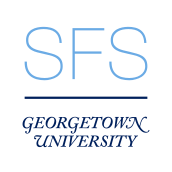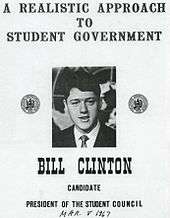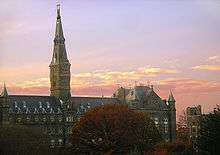School of Foreign Service
The Edmund A. Walsh School of Foreign Service, also shortened as the School of Foreign Service or SFS, is a school of international relations at Georgetown University in Washington, D.C. It is considered to be one of the world's leading international affairs schools,[2] granting degrees at both undergraduate and graduate levels. Notable alumni include U.S. president Bill Clinton, former CIA director George Tenet, and King Felipe VI of Spain, as well as the heads of state or government of many countries. Its faculty has also included many distinguished figures in international affairs, such as former U.S. secretary of state Madeleine Albright, former U.S. secretary of defense Chuck Hagel, and former president of Poland Aleksander Kwaśniewski.[3]
 Logo of the Walsh School of Foreign Service at Georgetown University. | |
| Type | Private |
|---|---|
| Established | 1919[1] |
Parent institution | Georgetown University |
| Affiliation | Roman Catholic (Jesuit) |
| Dean | Joel Hellman |
Academic staff | 134 (Main campus) |
| Students | 2,273[1] |
| Undergraduates | 1,423[1] |
| Postgraduates | 850[1] |
| Location | , , 38°54′32″N 77°4′25″W |
| Campus | Urban |
| Affiliations | APSIA |
| Website | sfs |
Founded in 1919, the School of Foreign Service predates the U.S. Foreign Service by six years and is known for the large number of graduates who end up working in U.S. foreign policy.[4] Despite its reputation for producing prominent American statesmen and diplomats, the SFS is not a diplomatic academy, and its graduates go on to have careers in a diverse set of sectors, including Wall Street.
The School of Foreign Service was established by Fr. Edmund A. Walsh, S.J. with the goal of preparing Americans for various international professions in the wake of expanding U.S. involvement in world affairs after the First World War. Today, the school hosts a student body of approximately 2,250 from over 100 nations each year. It offers an undergraduate program based in the liberal arts, which leads to the Bachelor of Science in Foreign Service (BSFS) degree, as well as eight interdisciplinary graduate programs.[1]
History
The school has evolved from its original emphasis on diplomacy and law to become a center for research and teaching on global affairs. Faculty are today drawn from disciplines such as political science, history, economics and cultural studies, as well as from business, the non-profit sector and international organizations. Originally known as the School of Foreign Service, it was named for Edmund A. Walsh in 1958.[5]
The school has about 1,400 undergraduates seeking a Bachelor of Science in Foreign Service (BSFS) degree. The undergraduate program is intended to provide a liberal arts education with a focus in international affairs. Undergraduates can choose between eight majors: International Politics (IPOL), International History (IHIS), Culture and Politics (CULP), International Economics (IECO), International Political Economy (IPEC), Regional and Comparative Studies (RCST), Global Business (GBUS), or Science, Technology, & International Affairs (STIA). The STIA program was the first of its kind. Harvard University and the Georgia Institute of Technology, among others, now have STIA programs as well.
Graduate students can pursue eight graduate programs: five regional studies programs as well as the Master of Science in Foreign Service (MSFS), Master of Global Human Development, and the Master of Arts in Security Studies Program.
Graduates go on to careers in the public, private, and nonprofit sectors as well as further higher education. Alumni include current (Jordan, Lithuania, Spain, and Bosnia), and recent (United States, Philippines) heads of state. The current dean of the school is Joel Hellman. Notable faculty members at the Walsh School of Foreign Service have included former U.S. secretary of state Madeleine Albright, former United States secretary of state and Nobel Laureate Henry Kissinger, former U.S. undersecretary of defense Douglas Feith, former Polish president Aleksander Kwaśniewski, former U.S. national security advisor Anthony Lake, former U.S. senator and secretary of defense Chuck Hagel, former U.S. ambassador to the United Nations Donald McHenry, former CIA director George Tenet, former Malaysian deputy prime minister and current Malaysian opposition leader Anwar Ibrahim, former World Bank vice president Callisto Madavo, former SFS dean Robert Gallucci, former USAID administrator and special envoy for Sudan Andrew Natsios, ambassador of Israel to the United States Michael Oren, former prime minister of Spain José María Aznar, former president of Colombia Álvaro Uribe Vélez, and former US envoy for Middle East peace ambassador Dennis Ross.
Academics
Undergraduate programs
Following completion of the core requirements, students declare one of the following interdisciplinary majors:
- Culture and Politics (CULP)[6]
- Global Business (GBUS)[7]
- International Economics (IECO)[8]
- International History (IHIS)[9]
- International Political Economy (IPEC)[10]
- International Politics (IPOL)[11]
- Regional and Comparative Studies (RCST)[12]
- Science, Technology, & International Affairs (STIA) [13]
Graduate programs
Graduate students can pursue eight interdisciplinary graduate degrees in the school:[14]
- Master of Science in Foreign Service (MSFS)
- Master of Arts in Security Studies
- Master of Global Human Development
- Master of Arts in Arab Studies
- Master of Arts in Asian Studies
- Master of Arts in German and European Studies
- Master of Arts in Eurasian, Russian and East European Studies
- Master of Arts in Latin American Studies
There are also two joint degrees offered in partnership with Georgetown's McDonough School of Business. The first is the Global Executive MBA, which is offered in collaboration with the ESADE Business School in Spain. and the INCAE Business School in Costa Rica. The second is the MA in international business and policy.
SFS is a member of The Association of Professional Schools of International Affairs (APSIA), a group of public policy, public administration, and international affairs schools.
Certificates
Georgetown offers a number of undergraduate certificate programs: African studies, Arab studies, Asian studies, Australian & New Zealand studies, German and European studies, international business diplomacy, international development, Muslim-Christian understanding, Jewish civilization, justice & peace studies, Latin American studies, medieval studies, Russian & East European studies, social & political thought, and women's and gender studies.
Reputation and rankings
Georgetown's programs in international relations have consistently ranked among the best in the world in surveys of the field's academics that have been published biennially since 2005 by Foreign Policy magazine.[15] In 2014,and again in 2018, Foreign Policy ranked Georgetown's master's programs first in the world and its bachelor's programs fourth.[16] In a separate survey of makers of American foreign-policy from 2011, Georgetown ranked second overall, after Harvard, in the quality of preparation for a career in the U.S. government, regardless of degree earned.[17]
Campuses
The School of Foreign Service main campus, which is part of the main campus of Georgetown University, is located in the Georgetown neighborhood Northwest Washington, D.C. It opened another campus, the School of Foreign Service Qatar (also known as SFS-Q), in Doha's Education City, in the Emirate of Qatar in 2005. Many SFS undergraduates spend a minimum of one semester or a summer abroad, choosing from direct matriculation programs around the globe as well as programs of other universities and those run by Georgetown.
Notable alumni

- Abdullah II of Jordan (1987), King of Jordan
- Adel al-Jubeir (1984) Minister of State for Foreign Affairs of Saudi Arabia
- John R. Allen, former Commander of International Coalition in Afghanistan, President of Brookings Institution
- Steve Bannon (1983), White House Chief Strategist and Counselor to the President under President Trump
- José Durão Barroso (1987), President of the European Commission and former Prime Minister of Portugal
- Philip Bilden (1986), U.S. Secretary of the Navy nominee in the Trump administration
- Bill Bryant, Seattle Port Commissioner from 2008 to 2015
- George Casey (1970), U.S. Army Chief of Staff
- Laura Chinchilla Miranda (1959), 46th President of Costa Rica
- Paul Clement (1988), U.S. Solicitor General and Acting U.S. Attorney General
- Bill Clinton (1968), 42nd President of the United States
- Anne Dias-Griffin (1993), hedge fund manager
- Stéphane Dujarric (1988), Spokesman for UN Secretaries-General Kofi Annan, Ban Ki-moon and António Guterres
- Richard Durbin (1966), U.S. Senator from Illinois, Majority Whip of the United States Senate
- Felipe VI (1991), King of Spain
- Luis Fortuño (1982), Governor of Puerto Rico
- Dexter Goei (1993), CEO of Altice[18]
- Dalia Grybauskaitė, President of Lithuania
- Alexander Haig (1961), U.S. Secretary of State under Ronald Reagan, Supreme Allied Commander Europe of NATO (1974–79)
- Daniel Henninger, columnist, The Wall Street Journal
- Mushahid Hussain, Opposition Leader in Pakistan, candidate for President of Pakistan in 2008
- James L. Jones (1966), U.S. National Security Advisor under President Obama
- Eugen Jurzyca, Minister of Education of Slovakia
- John F. Kelly (1984), Retired Marine General, the 5th U.S. Secretary of Homeland Security and White House Chief of Staff in the Trump Administration
- Željko Komšić, President of Bosnia and Herzegovina from 2006 to 2014
- Taro Kono (1986), Foreign Minister of Japan
- Gloria Macapagal-Arroyo (1968), President of the Philippines from 2001 to 2010
- David Malpass (1982), President of the World Bank
- Denis McDonough (1996), President Obama's Chief of Staff and former Deputy National Security Advisor
- Kayleigh McEnany (2010), CNN Commentator; press secretary to President Trump
- Maeve Kennedy McKean (2009), attorney and U.S. Health official
- Mick Mulvaney (1989), Director of U.S. Office of Management and Budget and White House Chief of Staff under President Trump
- Kirstjen Nielsen (1994), U.S. Secretary of Homeland Security under President Trump
- Darcy Olsen, CEO of the Goldwater Institute
- Armand Peschard-Sverdrup, Mexican political scientist
- Pat Quinn (1969), Governor of Illinois
- Carl Reiner (1943), actor, film producer, film director, Emmy Award winner
- Tony Ressler (1981), billionaire and owner of the Atlanta Hawks
- Matthew A. Reynolds (1986), former Assistant Secretary of State for Legislative Affairs (2008–2009)
- Chris Sacca (1997), Founder of Lowercase Capital [19]
- Arjun Singh Sethi (2003), civil rights writer and lawyer
- Debora Spar (1984), Former President, Barnard College at Columbia University, member Board of Directors of Goldman Sachs, first female President of Lincoln Center
- Courtney Stadd[20] (1981), NASA Chief of Staff from 2001–2003
- Daniel Sullivan (1993), U.S. Senator from Alaska
- George Tenet (1976), Director of the CIA from 1997 to 2004
- Matthew VanDyke, freedom fighter and Prisoner of War (POW) in the 2011 Libyan Civil War
- Marcus Wallenberg, a banker and industrialist
- Margaret Weichert (1989), Deputy Director for Management in the Office of Management and Budget, Director of the U.S. Office of Personnel Management
- Wang Yi (1998), Foreign Minister of the People's Republic of China
References
- "Georgetown Key Facts". Georgetown University.
- Foreign Policy Magazine "The Best International Relations Schools in the World", Inside the Ivory Tower 2018
- "Walsh School of Foreign Service, Faculty List". Archived from the original on October 21, 2007. Retrieved February 25, 2008.
- Lim, Alex (January 23, 2010). "Foreign Affairs". The Straits Times. Retrieved February 25, 2012.
- McNamara, Patrick (2005). A Catholic Cold War: Edmund A. Walsh, S.J., and the Politics of American Anticommunism. New York: Fordham University Press. p. 13. ISBN 0-8232-2459-7. Archived from the original on September 17, 2019. Retrieved September 17, 2019 – via Google Books.CS1 maint: ref=harv (link)
- "Culture and Politics Major - School of Foreign Service - Georgetown University". November 1, 2015.
- "Archived copy". Archived from the original on April 2, 2015. Retrieved March 16, 2015.CS1 maint: archived copy as title (link)
- "Archived copy". Archived from the original on March 23, 2015. Retrieved March 16, 2015.CS1 maint: archived copy as title (link)
- "Archived copy". Archived from the original on March 5, 2015. Retrieved March 16, 2015.CS1 maint: archived copy as title (link)
- "International Politics Major - School of Foreign Service - Georgetown University". October 27, 2015.
- "Archived copy". Archived from the original on March 5, 2015. Retrieved March 16, 2015.CS1 maint: archived copy as title (link)
- "Science, Technology and International Affairs Major - School of Foreign Service - Georgetown University". October 24, 2015.
- http://sfs.georgetown.edu/graduate/
- "Archived copy". Archived from the original on February 5, 2012. Retrieved February 5, 2012.CS1 maint: archived copy as title (link)
- "The Best International Relations Schools in the World" – via Foreign Policy.
- "Pipeline to the Beltway?" – via Foreign Policy.
- "Goei, Dexter". Reuters. Retrieved May 21, 2015.
- "Prominent Alumni – School of Foreign Service". sfs.georgetown.edu. Retrieved May 2, 2016.
- Courtney Stadd

